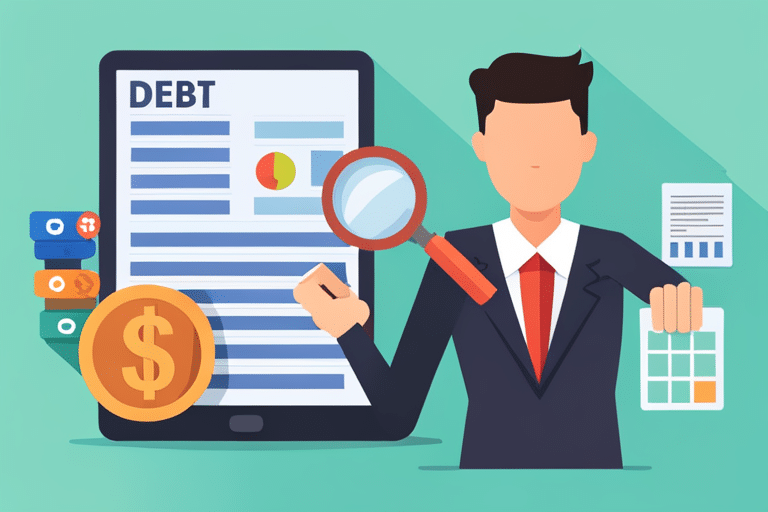Imagine you are lost in a maze of debt, desperately searching for a way out. But fear not, weary traveler, for there are five key principles that will guide you to financial freedom.
Assess your current situation, set realistic goals, and create a budget to stay on track.
Prioritize and organize your debts, while exploring consolidation options.
Build an emergency fund and avoid additional debt along the way.
Seek professional assistance when needed and above all, maintain a positive mindset to conquer this challenging journey towards debt management mastery.
Key Takeaways
- Assess and understand your financial situation
- Set goals and create a budget
- Prioritize and organize debts
- Seek professional assistance and maintain a positive mindset
Assessing Your Current Financial Situation

You should start by assessing your current financial situation to determine how much debt you are in. Imagine yourself as a detective, on a mission to uncover the truth about your finances. Put on your metaphorical Sherlock Holmes hat and grab your magnifying glass (or spreadsheet) as you embark on this investigation.
First, assess your financial stability. Take a look at all your assets and liabilities. Calculate the value of everything you own, from that vintage comic book collection gathering dust in the attic to that shiny new car parked outside.
Next, evaluate your income sources. Are you earning enough to cover your expenses? Do you have multiple streams of income or rely solely on one job?
Once you have gathered all the evidence, it’s time to transition into setting realistic goals for debt reduction. Armed with a clear understanding of where you stand financially, you can now move forward with confidence and create a plan tailored specifically to your needs. It’s like charting a course for treasure hunting – each step brings you closer to reaching that coveted goal of becoming debt-free.
Setting Realistic Goals for Debt Reduction

Setting realistic goals for debt reduction involves understanding your current financial situation and making a plan to gradually decrease your outstanding debts. It’s like embarking on a journey towards financial freedom, where each step you take brings you closer to your ultimate goal. But don’t worry, it doesn’t have to be an arduous task!
Here are five fun and effective ways to set realistic goals for debt reduction:
-
Break it down: Divide your total debt into manageable chunks. Set smaller, achievable goals that will keep you motivated along the way.
-
Prioritize wisely: Identify which debts have the highest interest rates or fees and focus on paying those off first. This strategic approach will help you save money in the long run.
-
Create a timeline: Set a target date for when you want to be debt-free. Having a timeframe in mind will give you something concrete to work towards.
-
Track your progress: Regularly monitor how much of your debt you’ve paid off. Celebrate small victories and stay motivated by seeing tangible results.
-
Stay flexible: Life happens, unexpected expenses pop up, and setbacks occur. Be adaptable with your goals and adjust them as needed.
Creating a Budget and Sticking to It

Creating a budget and sticking to it is crucial for maintaining financial stability and achieving your long-term goals. It’s like embarking on a grand adventure, mapping out your financial journey. Imagine yourself as a fearless explorer, charting unknown territories of income and expenses.
First, create your financial plan – the treasure map that will guide you towards your goals. Start by tracking all of your expenses. Be diligent in recording every penny you spend, whether it’s on lattes or concert tickets. This will help you understand where your money is going and identify areas where you can cut back.
Next, set realistic goals for yourself. Maybe you want to save up for that dream vacation or pay off those credit card bills. Whatever it may be, make sure your goals are specific and achievable.
Now comes the fun part – creating your budget! Think of it as building a sturdy ship to sail across the sea of financial uncertainty. Allocate funds for essentials like rent and groceries first, then divvy up the rest between savings and discretionary spending.
Lastly, stick to your budget like glue! Resist the temptation to stray off course and splurge on unnecessary items. Remember, every dollar saved brings you one step closer to reaching your ultimate destination – financial freedom!
Prioritizing and Organizing Your Debts

So, you’ve mastered the art of budgeting and now it’s time to tackle those pesky debts. Don’t worry, we’ve got your back!
In this discussion, we’ll explore some clever debt payment strategies that will make you feel like a financial ninja. We’ll also dive into debt prioritization methods and how to organize your repayment plan like a pro.
Get ready to conquer those debts and unleash your inner money superhero!
Debt Payment Strategies
You should prioritize your debt payment strategies to effectively manage your debts. Debt can feel like a dark cloud hanging over you, but fear not! With the right approach, you can conquer it and regain control of your financial life.
Here are five creative debt payment strategies that will help you on your journey to debt-free bliss:
-
Debt Snowball: Start by paying off your smallest debts first while making minimum payments on larger ones. As each small debt is eliminated, roll that payment into the next one until they’re all gone.
-
Debt Avalanche: Focus on paying off debts with the highest interest rates first. By tackling those high-interest beasts head-on, you’ll save more money in the long run.
Debt Prioritization Methods
When prioritizing your debts, it’s important to consider the interest rates and payment terms of each. Think of it as a debt juggling act, where you’re trying to keep all the balls in the air without dropping any.
Start by listing all your debts and their respective interest rates. Then, focus on paying off the high-interest ones first. It’s like slaying dragons – tackle the biggest, scariest one first!
Once you’ve conquered those high-interest debts, move on to the next ones with slightly lower rates. Remember, this is a marathon, not a sprint. Be patient with yourself and celebrate each small victory along the way.
Organizing Debt Repayment
Start by creating a detailed list of all your debts and their corresponding payment amounts. This will help you get a clear picture of what you owe and how much you need to allocate towards each debt.
Once you have organized your debt repayment, it’s time to create a budget that works for you. Here are five items to consider when organizing your debt repayment:
- Prioritize high-interest debts first
- Consider debt consolidation options
- Negotiate with creditors for lower interest rates or extended repayment terms
- Cut back on unnecessary expenses to free up more money for debt payments
- Set realistic goals and milestones to track your progress
Exploring Debt Consolidation Options

Consider exploring debt consolidation options to help manage your debts more effectively.
Imagine a world where all your debts are combined into one tidy package, like a bouquet of flowers neatly tied with a ribbon. Debt consolidation can make that dream a reality by combining multiple loans into a single, more manageable loan.
When exploring loan options, it’s important to compare interest rates. Think of it as going on an adventure through the land of loans, where you uncover hidden treasures and find the best interest rates that fit your needs.
As you embark on this journey, keep in mind that lower interest rates can save you money in the long run.
But don’t worry, you won’t have to navigate this enchanted forest alone. There are countless financial wizards out there ready to guide you through the process of debt consolidation. They will assist you in finding the perfect loan option and comparing those magical interest rates.
So wave goodbye to overwhelming debt and say hello to a brighter financial future.
Explore your debt consolidation options today and watch as your debts transform from towering mountains into gentle rolling hills.
With the right loan and some careful planning, you’ll be well on your way towards mastering effective debt management!
Negotiating With Creditors for Better Terms

Take a moment to imagine how negotiating with creditors for better terms can help alleviate some of the financial stress you may be experiencing.
Picture yourself sitting down with your creditors, armed with negotiation techniques that will make them see things from your perspective. It’s a daunting task, but don’t worry, you’ve got this!
Here are five key principles to keep in mind when negotiating with your creditors:
-
Empathy: Put yourself in their shoes and understand their perspective. Remember that they also want to find a mutually beneficial solution.
-
Preparation: Do your homework and gather all the necessary information about your debts before entering into negotiations. This will give you confidence and leverage.
-
Communication: Be clear, concise, and respectful in expressing your needs and concerns. Effective communication is crucial for reaching a favorable agreement.
-
Flexibility: Be open to compromise and explore different options that both parties can agree on. Sometimes finding middle ground is the best way forward.
-
Persistence: Negotiating can be challenging, but don’t give up easily. Keep pushing for what you believe is fair until you achieve a satisfactory outcome.
Utilizing Debt Repayment Strategies

Picture this: you’re standing at the foot of a snowy mountain, ready to tackle your debt head-on. But which path should you take?
Should you go for the thrilling Snowball route, where you start by paying off your smallest debts first and build momentum as you go?
Or would you rather navigate the treacherous Avalanche trail, where you tackle high-interest debts first and save yourself from an avalanche of interest?
And if neither option seems appealing, fear not – there are also debt consolidation options that can help simplify your repayment journey.
Let’s explore these strategies together and find the one that suits your financial adventure best!
Snowball Vs Avalanche
You should prioritize paying off your debts using either the snowball or avalanche method. These two strategies can help you tackle your debts effectively and efficiently.
Here are five reasons why choosing between the snowball and avalanche method is crucial in mastering debt management:
-
Motivation Boost: With the snowball method, you start by paying off your smallest debt first, giving you a sense of accomplishment early on.
-
Interest Savings: The avalanche method focuses on paying off high-interest debts first, helping you save money in the long run.
-
Flexibility: The snowball method allows for more flexibility as it focuses on smaller debts, giving you more room to adjust your payments.
-
Faster Results: The avalanche method prioritizes paying off high-interest debts, helping you become debt-free quicker.
-
Personal Preference: Ultimately, choosing between these methods depends on your personality and financial goals.
Debt Consolidation Options
Now that you’ve learned about the Snowball and Avalanche methods, let’s dive into another debt management option: Debt Consolidation.
This magical solution combines all your debts into one, like a superhero swooping in to save the day! With debt consolidation, you can say goodbye to juggling multiple payments and hello to simplicity.
But wait, there’s more! Debt consolidation offers some fantastic benefits. First off, it can lower your interest rates and monthly payments, giving you some much-needed breathing room. It also simplifies your financial life by consolidating everything into one neat package. No more chasing different due dates or deciphering confusing statements!
However, as with any financial decision, there are risks involved. Debt consolidation might tempt you to rack up more debt if you’re not careful. Plus, if you don’t manage your finances responsibly moving forward, those consolidated loans could end up costing even more in the long run.
Building an Emergency Fund

Start by setting aside a portion of your income each month to build up an emergency fund. Think of it as your safety net, your secret stash, or even your superhero cape when unexpected expenses come flying at you. Building savings should be a top priority on your financial journey, because life has its way of throwing curveballs when you least expect it.
So, let’s dive into the exciting world of emergency savings and discover five key principles that will help you master this important skill:
- Consistency is key: Make saving a habit by automating regular contributions to your emergency fund.
- Set realistic goals: Start small and gradually increase the amount you save each month.
- Keep it separate: Create a separate account for your emergency fund to avoid temptation and ensure it remains untouched.
- Be prepared for surprises: Aim to save three to six months’ worth of living expenses in case of job loss or other unforeseen circumstances.
- Celebrate milestones: Reward yourself whenever you reach a savings milestone – treat yourself without jeopardizing the progress you’ve made.
Avoiding Additional Debt

To avoid accumulating more debt, it’s important to prioritize your spending and make conscious decisions about where your money goes.
Imagine this: you’re strolling through a mall, surrounded by colorful displays and enticing sales signs. Your favorite store beckons you with its shiny new collection. But wait! Before you whip out that credit card and dive headfirst into the world of impulse purchases, take a moment to consider the consequences.
Managing credit card usage is crucial in avoiding additional debt. It’s like taming a wild beast – if not handled properly, it can quickly spiral out of control. So, before swiping that plastic wonder, ask yourself: do I really need this? Will it bring me long-term joy or just instant gratification? By being mindful of your spending habits and making intentional choices, you can stay on top of your financial game.
When faced with the temptation of impulse purchases, try implementing some strategies to curb those urges. Take a deep breath and walk away for a few minutes – chances are that initial excitement will fade once you’ve had time to think it over. Another helpful tip is to set a budget for discretionary spending each month. This way, you’ll know exactly how much leeway you have without going overboard.
Seeking Professional Assistance When Needed

If you’re feeling overwhelmed by your financial situation, don’t hesitate to reach out for professional assistance. Seeking professional guidance can provide you with the necessary tools and knowledge to effectively manage your debt and improve your financial wellbeing. Financial counseling is not only for those in dire straits; it can benefit anyone looking to gain mastery over their finances.
Here are five reasons why professional assistance might be just what you need:
-
Expertise: Financial counselors have specialized knowledge and experience in dealing with various financial situations. They can offer personalized advice tailored to your specific needs.
-
Objectivity: Sometimes, we get so caught up in our own financial struggles that it becomes difficult to see the bigger picture. A professional counselor can provide an objective perspective on your situation and help you make sound decisions.
-
Accountability: Having someone hold you accountable for your financial goals can be a game-changer. A counselor will keep track of your progress and motivate you to stay on track.
-
Education: Financial counseling provides an opportunity to learn about budgeting, saving, investing, and other important aspects of personal finance. You’ll gain valuable skills that will serve you well throughout life.
-
Support: Dealing with debt can be emotionally taxing. Having a supportive professional by your side can make the journey much easier.
Maintaining a Positive Mindset and Staying Motivated

Hey there, champ! Are you ready to dive into the world of maintaining a positive mindset and staying motivated?
Well, buckle up because we’re about to explore the importance of having a positive mindset, discover some nifty strategies for staying motivated, and learn how to overcome those pesky obstacles and setbacks.
Importance of Positive Mindset
Maintaining a positive mindset is crucial for effective debt management. Your mindset plays a significant role in determining your financial success. By cultivating a positive outlook, you can conquer the challenges of managing debt and pave the way for a brighter future.
Here are five key principles to help you maintain a positive mindset:
-
Embrace gratitude: Focus on the things you have rather than what you lack. Expressing gratitude can shift your perspective and bring positivity into your life.
-
Practice self-care: Take care of yourself physically, emotionally, and mentally. Engage in activities that bring joy and reduce stress.
-
Set realistic goals: Break down your debt management journey into smaller achievable goals. Celebrate each milestone along the way to keep yourself motivated.
-
Surround yourself with positivity: Choose to be around supportive friends and family who uplift and encourage you on your debt management journey.
-
Stay focused on progress: Even small steps forward count as progress. Celebrate every win, no matter how small, to keep moving towards financial freedom.
Strategies for Staying Motivated
To stay motivated, you can set achievable goals and celebrate each milestone along your debt management journey. Think of these goals as stepping stones that lead you to financial freedom.
Start by breaking down your debt into manageable chunks and create a plan to tackle them one by one. This way, you can see progress and feel a sense of accomplishment with each debt paid off.
Don’t forget to reward yourself along the way! Treat yourself to something small but meaningful whenever you reach a milestone or achieve a goal.
Maintaining a positive mindset is crucial in staying motivated throughout this process. Remember to stay focused on the end result and visualize how amazing it will feel once you are debt-free.
Now, let’s explore some strategies for overcoming obstacles and setbacks on your debt management journey…
Overcoming Obstacles and Setbacks
If you encounter any obstacles or setbacks on your debt management journey, remember to stay resilient and keep pushing forward. Overcoming setbacks is an essential part of achieving your financial goals.
Here are five strategies to help you stay motivated:
- Embrace the power of positive thinking: Shift your mindset and believe that you have the ability to overcome any challenge.
- Break it down: Divide your debt management journey into smaller, manageable tasks to make progress more achievable.
- Seek support: Surround yourself with a network of people who understand and support your goals.
- Celebrate small wins: Acknowledge and reward yourself for each milestone reached along the way.
- Learn from setbacks: Use setbacks as opportunities for growth and learn valuable lessons from them.
Frequently Asked Questions
How Can I Improve My Credit Score While Managing My Debt?
You can improve your credit score while managing debt by paying your bills on time, keeping your credit utilization low, and monitoring your credit report regularly. It’s like a financial superhero saving the day!
Are There Any Tax Implications Associated With Certain Debt Management Strategies?
When managing your debt, it’s important to consider the potential tax implications. Certain strategies may have consequences for your taxes. Stay informed and make sure you understand the impact on your financial situation.
What Are Some Common Mistakes People Make When Trying to Reduce Their Debt?
Common mistakes in reducing debt include not creating a budget, ignoring high-interest rates, and neglecting to negotiate with creditors. Avoid these blunders by being proactive, staying organized, and seeking professional advice if needed.
How Can I Prevent Myself From Falling Back Into Debt After Paying off My Current Debts?
To prevent relapse into debt after paying off your current debts, stay focused on staying debt-free. Create a budget, track your expenses, and save for emergencies. Remember, avoiding temptation is easier when you have a plan.
Are There Any Government Programs or Resources Available to Help With Debt Management?
You’ll be relieved to know that there are government programs and resources available to help with debt management. These can provide much-needed assistance and relief in your journey towards financial freedom.
Conclusion
Congratulations! You’ve made it to the end of this debt management journey. By following these five key principles, you’re well on your way to financial freedom and peace of mind.
Remember, staying motivated is essential throughout this process. Did you know that a recent study found that individuals who actively manage their debts are 30% more likely to reach their financial goals?
So keep pushing forward, stay positive, and watch as your debt disappears like magic!

